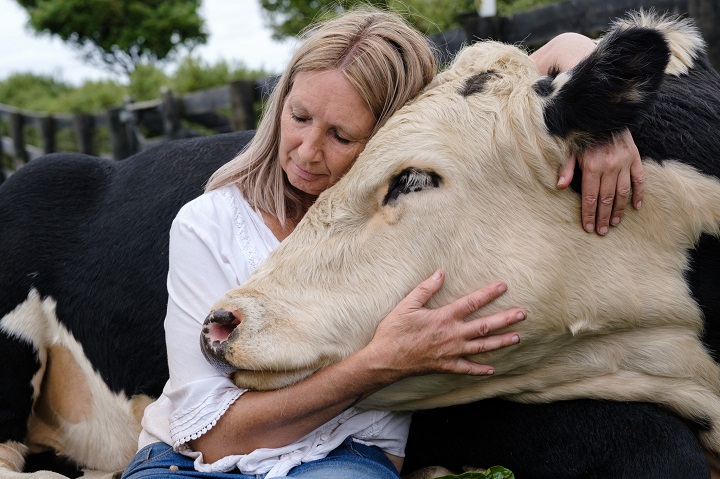Cultural Psychosis: The Cruel Deaths Of The Two Cows Who Escaped Whanganui Slaughterhouse
With a sense of sadness I read a news piece on two cows who escaped Waimarie Meats slaughterhouse in Whanganui on July 11, 2022. One ended up being shot and killed by police. The other was contained and returned to the slaughterhouse.
It’s anyone’s guess whose plate those two cows will end up on in the near future.
This is tragic, and yet it was enough for people to reveal their human-centred take on the event in the cruellest way. Despite being offered sanctuary, the living cow was returned to slaughter.
Almost immediately people began poking fun at the plight of these cows on social media and radio stations .
George FM picked up on the incident and deliberately wrote a pun-filled piece. They begin by saying, ‘Police in Whanganui are having beef with a couple of criminal cows on the loose’. They talked about a police ‘steak out’.
This article also referred to people who did not want to read it as ‘çow-wards’ and made a plea for safer ‘çow-munities’. ‘
These puns are funny, but they are misplaced and wrong-headed.
I am going to be upfront from the beginning. I am a vegan activist and writer. When hearing about the escape and subsequent deaths of these two cows I was filled with depression. It made me feel anxious. I don’t think it’s a laughing matter. In fact, I cried.
And I understand why people make fun. The people who find this funny are not horrible people. They are conditioned to draw on ideologies of human superiority and speciesism. It’s in our cultural DNA as Kiwis.
These same people would probably be horrified if it were a human running from captivity and being hunted down by police and shot. Even more so if the police were sending this person to a slaughterhouse of some kind. Especially so if the person was innocent of all wrongdoing.
It is clear to me that these animals were under considerable distress and were scared for their lives. They were traumatised.
Evolutionary psychology suggests that animals and humans share four basic and primal drives when experiencing trauma and danger. These include fight, flight, freeze and fawn.
We talk a lot about human trauma these days. Yet animals also experience trauma responses and our kinship with them should evoke empathy not cruelty.
These cows were in flight mode. They were terrified and running for their lives. And we think it is funny.
It speaks to humanity's dysfunctional relationship with animals. It points directly to the cruel side of us on a cultural level.
It is of course not surprising that the plight of these animals largely became a source of fun. If eating the bodies of cows is normalised, then any cultural empathy for their plight is not to be expected.
In Aotearoa and many countries across the globe we are socialised from birth to accept eating the meat of cows as normal.
Statistics tell us that across Aotearoa 4.63 million ‘beef cattle’ were slaughtered from 2017 to 2020.
By the way, the word ‘cattle’ comes from Middle English ‘catel’ meaning ‘personal property’.
We consider cows as our personal property and control them as if they have no agency. This is a human-centric worldview, denying these animals any sense of agency over their own lives.
In Aotearoa we kill them in enormous numbers and sizzle their flesh on BBQs during summer months. We drink the milk that they make for their young, killing many of their calves at a mere 4-10 days of age.
If you think about it deeply enough (and I hope you do) then we could say our cultural relationship with animals who are farmed is psychotic.
The hallmarks are all there: lack of empathy, bullying and controlling behaviours, and murderous intent.
I have a pet steer called Harry with which I share a wonderful and close relationship. I understand that bovines are complex and sensitive beings. I know that we humans are too. And we can do better than this in our relationship with non-human animals.
I want to be a voice for those two cows as they ran in terror for their lives. I want to remember them as sentient beings who deserved so much more from life than what we did to them.

Photo Credit: Jinki Cambronero.


 Binoy Kampmark: Fallibility, Dirty Wars And Pope Francis I
Binoy Kampmark: Fallibility, Dirty Wars And Pope Francis I Peter Dunne: Dunne's Weekly - An Issue No-one Can Afford To Lose
Peter Dunne: Dunne's Weekly - An Issue No-one Can Afford To Lose Martin LeFevre - Meditations: Choosing Mass Murder?
Martin LeFevre - Meditations: Choosing Mass Murder? Eugene Doyle: Quiet Mutiny - The U.S. Army Falls Apart
Eugene Doyle: Quiet Mutiny - The U.S. Army Falls Apart Gordon Campbell: Papal Picks, And India As A Defence Ally
Gordon Campbell: Papal Picks, And India As A Defence Ally Binoy Kampmark: The Selling Of America - Ending The US Dollar’s Exorbitant Privilege
Binoy Kampmark: The Selling Of America - Ending The US Dollar’s Exorbitant Privilege